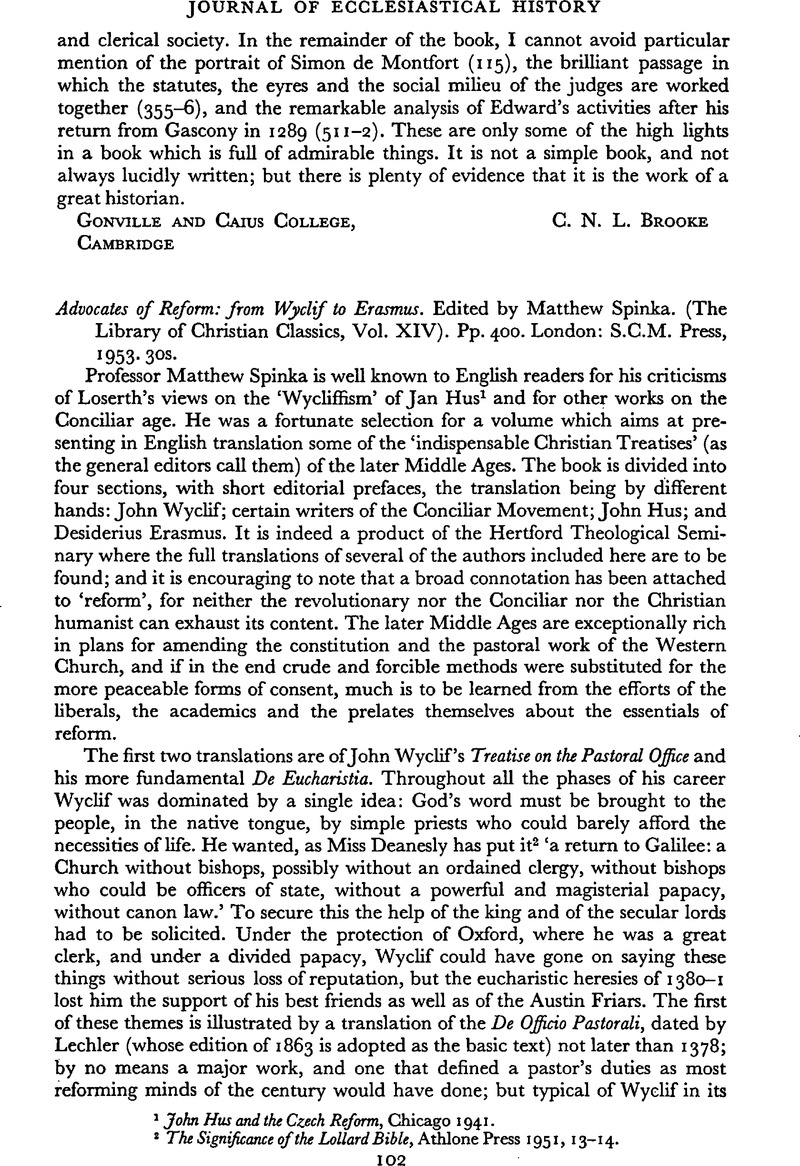No CrossRef data available.
Article contents
Advocates of Reform: from Wyclif to Erasmus. Edited by Matthew Spinka. (The Library of Christian Classics, Vol. XIV). Pp. 400. London: S.C.M. Press, 1953. 30s.
Published online by Cambridge University Press: 25 March 2011
Abstract

- Type
- Reviews
- Information
- Copyright
- Copyright © Cambridge University Press 1955
References
page 102 note 1 John Hus and the Czech Reform, Chicago 1941.Google Scholar
page 102 note 2 The Significance of the Lollard Bible, Athlone Press 1951, 13–14.Google Scholar
page 103 note 1 Thus in Part I, Ch. 5 ‘quod omnes curati secundum legem domini introducti’ is translated ‘all curates ought according to the law of the Lord to be induced’ [to live solely on material alms], when it should be ‘all incumbents brought into their cures according to the law of the lord’ (i.e. not simoniacally, or in other respects against strict requirements); in Ch. 7, the characteristic Wycliffian ‘prelato suo cesareo’ is weakly rendered ‘his lord [instead of‘lordly’] prelate’; in Ch. 9, ‘ex ista sentencia iam proximo dicta prodesset istds novis ordinibus cum novis collegiis quibus per artem novam appropriantur ecclesie’ is given as ‘From this opinion just now set forth these new orders would have been provided with new colleges, through which by a novel device churches are appropriated.’ The omission of the ending of Ch. 8 makes the sense of this mistranslated sentence unintelligible. In Ch. 15 ‘pauperibus impertiri’ means ‘bestowed upon the poor’, not ‘shared with the poor’; and in the same chapter ‘bosco’ does not mean orchard, but any sort of wood. In Ch. 16, ‘nisi gracia huius finis’ does not mean ‘unless there is grace in this’, but ‘unless [he does the latter] for the sake of the [spiritual] end’. In Ch. 19, ‘nee refert quod curati tales habent simul multa beneficia in usum alium transmutata, nisi quod generant peccatum multiplici ratione’ is rendered ‘nor does it matter that such curates have at the same time many benefices transformed into another use, so that they may not bring forth sin with manifold reason’, instead of ‘save that they generate sin for manifold reason’. In Part II, Ch. 6, ‘nolunt secte alteri castra talia edificare,’ ‘do not wish to build such castles [the Castles of Cain] for another sect’ is translated ‘do not wish another sect to build such castles’; ibid., ‘ideo sciant mundani quantumcunque hie dominentur in seculo’ is rendered ‘however much these are dominated’ (though dominor is intransitive); Ch. 8, ‘scitur tamen quod spiritualia opera misericordie que debent impendi per vices, requirant proporcionem localem pastoris ad oves’ is rendered ‘Yet it is known that the necessary spiritual works of mercy require a local relationship between pastor and flock’, ‘que debent impendi per vices’ (‘which have to be done through the service of others]) being omitted. Ch. 9. ‘Et cum consensus sit tantum facinus, debent timere deum atque diabolum de consensus’ is rendered ‘and when they had agreed to such a crime, they ought to fear God and the Devil out of consent’ instead of ‘and since to agree about this is so great a crime, they ought to fear God and the devil alike for having so agreed’. Ch. 11, ‘in secundo gradu sunt habentes possessionem temporalium mobilium vocatorum secundum nimiam sollicitudinem possidendi’ is given as ‘in the second degree are those having only slighdy anxious possession of so-called temporal movable goods’!
page 104 note 1 The Church, Dietrich holds, is a res publica, a commonwealth. On p. 149 respublica is nustranslated ‘the Welfare of the Church’.


